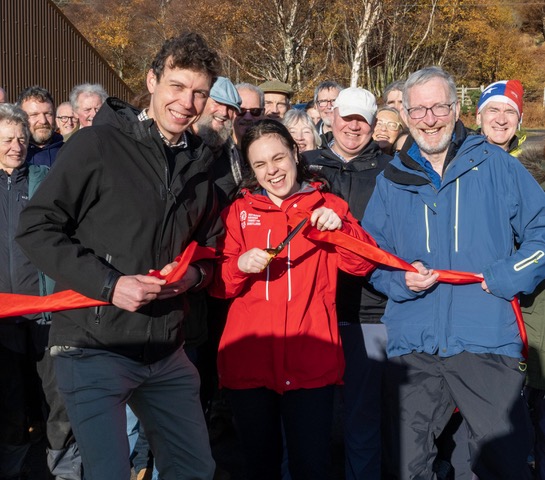A new low carbon trailhead car park and off-grid toilet facility at Stac Pollaidh, Ross-shire, has been officially opened by Deputy First Minister and Cabinet Secretary for Economy and Gaelic, Kate Forbes.
The £836,944 project marks a major step forward for sustainable tourism in the Highlands, ensuring that one of Scotland’s most iconic hills can continue to welcome thousands of walkers each year without damaging the fragile landscape that surrounds it.
Each year, more than 55,000 people climb Stac Pollaidh, drawn by its famous jagged ridge and breathtaking views over Assynt and the Summer Isles.
The previous 20-space car park was no longer fit for purpose, regularly overwhelmed by visitors and causing congestion on the narrow single-track access road near the North Coast 500.
In 2019, the Coigach Community Council and Inverpolly Estate joined forces with The Highland Council and invited the Outdoor Access Trust for Scotland (OATS) to find a long-term solution.
Their answer is a modern, environmentally responsible facility that combines innovation with respect for the land.
The new 78-space car park, powered by solar panels and battery storage, also includes off-grid toilet facilities and a processing tank, a self-contained system designed for sensitive rural environments.
Kate Forbes praised the collaboration behind the project and the message it sends about how communities, charities, and government can work together to achieve real results.
“With the growing popularity of Scotland’s rural beauty spots, we must ensure tourism is sustainable and doesn’t put unnecessary strain on local services and communities,” she said.
“These new amenities will serve Stac Pollaidh’s 55,000 visitors a year and ensure the people and businesses based in the area can enjoy the positive impacts of tourism.”
The development was funded through the Rural Tourism Infrastructure Fund (£490,144), the UK Shared Prosperity Fund (£143,000), the Community Regeneration Fund (£30,000), and a significant £173,800 contribution from OATS.
Construction began in 2024 and, despite challenges linked to the site’s remote location and difficult ground conditions, the car park opened in April 2025, with the toilet facility completed in October.
Shortly after opening, the car park played an unexpected but vital role, serving as a command base for emergency services during the wildfires that swept across the mountain for three days in April.
Duncan Bryden, Chair of the Outdoor Access Trust for Scotland, said the project reflects what can be achieved when environmental stewardship and practical infrastructure come together.
“To tackle growing visitor pressures and keep people safe, OATS are delighted to be opening our facility at Stac Pollaidh, an iconic mountain north of Ullapool,” he said.
“Powered by solar panels and batteries plus bore hole water, these are OATS’ first low carbon off-grid facilities.
“Income from visitor parking goes back into facility and path maintenance.”
The site is also part of a wider vision for responsible access across the Highlands.
Future plans include new signage, interpretation panels, an all-abilities viewpoint path, and the repair of eroded mountain trails through OATS’ volunteer maintenance programme.
Councillor Ken Gowans, Chair of The Highland Council’s Economy and Infrastructure Committee, said the project demonstrates how joined-up working can deliver meaningful benefits for communities.
“With visitor numbers continuing to rise, the original car park had exceeded its capacity,” he said.
“These upgrades will greatly enhance the visitor experience while supporting the needs of both the local community and those exploring the area.”
Ann Macleod, Secretary of Coigach Community Council, said the project has brought welcome relief for residents.
“There have been longstanding problems with litter, fouling, and congestion,” she said.
“We are pleased that OATS, the landowners, the Highland Council and NatureScot reached a sensible solution.
“We trust that any eventual profits made by charging for the use of the facilities will be reinvested into the upkeep of the paths around this iconic and much-loved mountain.”
From congestion to conservation, Stac Pollaidh’s new facilities show what Highland communities can achieve, turning challenge into progress and protecting the land for generations to come.





